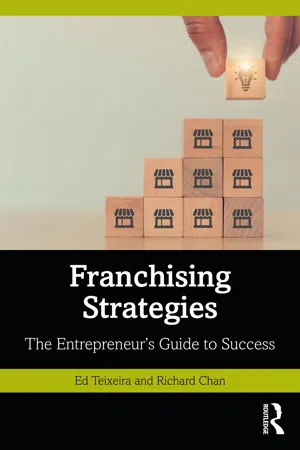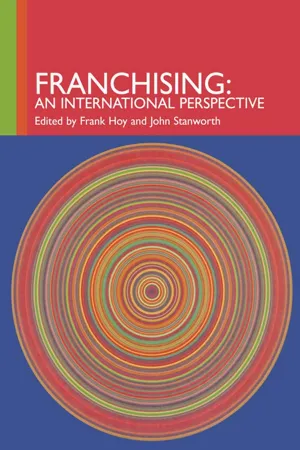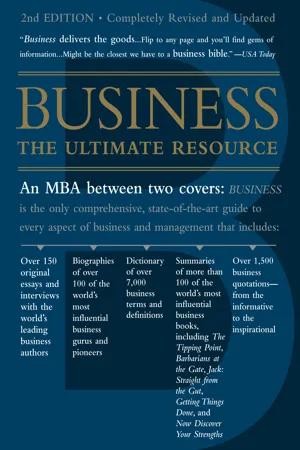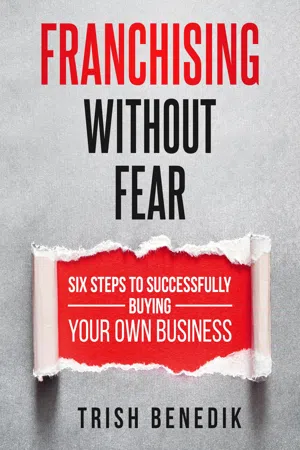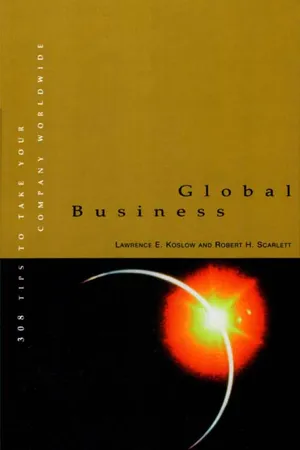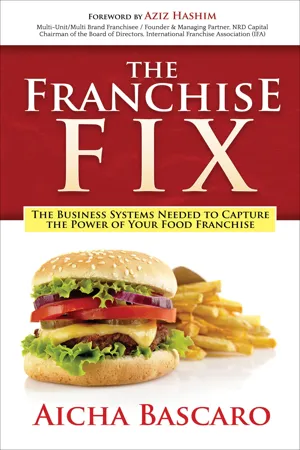Franchising
Franchising is a business strategy where a company (franchisor) allows independent entrepreneurs (franchisees) to use its trademark, business model, and operational support in exchange for fees and royalties. This arrangement enables the franchisor to expand its brand and reach new markets while providing the franchisee with a proven business concept and support system.
8 Key excerpts on "Franchising"
- eBook - ePub
Franchising Strategies
The Entrepreneur’s Guide to Success
- Ed Teixeira, Richard Chan(Authors)
- 2022(Publication Date)
- Routledge(Publisher)
...We illustrate Franchising history by describing how the franchise industry has evolved and grown into a dynamic business model exported throughout the world. We also highlight its corresponding advantages and disadvantages. We conclude by presenting the economic impact of Franchising, the various franchise sectors and categories, and relevant data pertaining to these franchises. Definition of Franchising Franchising is a business model that comprises contractual agreements between two groups of entrepreneurs: a franchisor who created a venture to advance an entrepreneurial opportunity, and a group of franchisees who purchase the right to use the brand name, operating process, and marketing system of that venture in new geographic markets. 4 In such a relationship, the franchisor not only grants a license to a third party in order to conduct business under their trademark, and specify the products and services to be offered by franchisees, but provide them with an operating system, brand, training, and marketing and logistic support. Although Franchising often involves the use of a license, it is distinct from licensing, another entrepreneurial growth strategy. Licensing refers to an agreement whereby a company (the licenser) grants the right to utilize intangible assets as a brand, such as intellectual property or an operation process, in exchange for buying and selling the company's products or services. Franchising is more than just the use of licensing, however: it is a contractual arrangement in which the franchisor allows the franchisee to conduct business using the brand or intellectual property as an independently operated entity within its franchise network. Licensees usually make a significant capital investment in designing and implementing their business operations...
- eBook - ePub
Straightforward Guide To Buying A Franchise
Changing Your Life With a Business That is Right for You
- (Author)
- 2015(Publication Date)
- Straightforward Publishing Digital(Publisher)
...Part 1 Franchising Generally Chapter 1 What is Franchising? Franchising-a definition and History The word ‘franchise’ is used in several contexts. In most dictionaries, the word is defined as follows: 1. A privilege or right officially granted a person or a group by a government, especially: a. The constitutional or statutory right to vote. b. The establishment of a corporation’s existence. c. The granting of certain rights and powers to a corporation. d. Legal immunity from servitude, certain burdens, or other restrictions. 2. a. Authorization granted to someone to sell or distribute a company’s goods or services in a certain area. b. A business or group of businesses established or operated under such authorization. c. A brand name under which a series of products is released. 3. The territory or limits within which immunity, a privilege, or a right may be exercised. You can see that particularly in the second definition, at its root, ‘franchise’ means that a right has been granted to someone or some group to do something or to have the power to do something-such as vote. In the context of this book, we are talking about business Franchising. What is business Franchising? In simple terms, a franchise is an agreement between two parties which allows one party i.e. the franchisee, to market products or services using the trademark and operating methods of the other party i.e. the franchisor. These rights are usually granted in return for a fee. There are two types of franchise methods - business format Franchising and product and trade name Franchising. Business Format Franchising The most common method in the UK is Business Format Franchising. Using this method, when you buy a franchise, the franchisor grants you, the franchisee, the use of their logos and trademarks, as well as a turn-key system for doing business...
- eBook - ePub
Franchising
An International Perspective
- Frank Hoy, John Stanworth(Authors)
- 2014(Publication Date)
- Routledge(Publisher)
...These involve a much less integrated relationship between the parties than occurs in the business format franchise on which the above definitions are mainly founded. However, whatever the problems, a working definition was required for the developing area of Franchising research. In 1983, in an attempt to meet some of the above points, Curran and Stanworth defined Franchising as: “A business form essentially consisting of an organization (the franchisor) with a market-tested business package centered on a product or service, entering into a continuing contractual relationship with franchisees, typically self-financed and independently owner-managed small firms, operating under the franchisor's trade name to produce and/or market goods or services according to a format specified by the franchisor” (1983, p.11). This definition was seen as covering most modern varieties of Franchising, and, in principle, no barriers appeared to exist to incorporating quasi-forms. In retrospect, this should be stressed as ideal-typical in approach. For instance, in practice, market-testing can be perfunctory. Franchisee self-financing is often supported significantly by loan finance from banks or other sources, including franchisors. Also, multi-unit franchisees and corporate franchisees that are found in some areas of Franchising such as fast food are clearly not always owned by small firm owner-managers. Indeed, some corporate franchisees may be larger than their franchisors measured by value of corporate assets, but in many areas small-scale ownership remains typical. Also, although the relationship is defined as a continuous one, the actual period covered will, of course, be variable. Some reference ought also to be made to the payment of fees or royalties of various kinds by franchisees to franchisors. But otherwise the definition embodies a gradually evolved consensus as the study of Franchising has developed...
- eBook - ePub
Business
The Ultimate Resource
- Bloomsbury Publishing(Author)
- 2011(Publication Date)
...Franchising Your Business GETTING STARTED If your business has suitable branded products or services and you’re looking to grow it with relatively low risk, then Franchising could provide a worthwhile route. the process can involve considerably less capital investment by you than other approaches to growth, because the franchisees you appoint will invest their money—and their time—in creating new outlets under your organizational umbrella. You will, however, need to undertake a considerable amount of planning and research to make sure that your business is suitable for Franchising and to enable you to create a successful franchise network. FAQs What is a franchise? In basic terms, a franchise is a legally binding agreement between you (the franchisor) and another business (the franchisee) that enables it to use your trade name and trademark, and supply your branded services or products under license. The franchisee will pay a fee in return for your granting them a franchise license, and they’ll have to comply with any terms and conditions set by you in the agreement. The European Franchise Federation describes it as “a system of marketing goods, products, or services, based on a close and ongoing collaboration between legally and financially separate and independent undertakings.” How will I make money from Franchising? There are two sources of income from Franchising: fees and the profit you could make from supplying materials to your franchisees. The fees come in the form of a onetime initial payment—the franchise fee—for granting a license, and an annual management charge for the support services you provide, which should include training and development. The latter fee is usually calculated as a percentage of your franchisees’ turnover. In order to attract suitable franchisees, it’s accepted practice to keep the franchise fee low and to provide good value for your management charge...
- eBook - ePub
Franchising Without Fear
Six Steps to Successfully Buying Your Own Business
- Trish Benedik(Author)
- 2019(Publication Date)
- Author Academy Elite(Publisher)
...Kinds of Franchises As I’ve been describing, Franchising is a method of doing business through granting of a license to individuals or groups to perform specific commercial activities. The franchisor and franchisee form a relationship that benefits both parties through expansion of the brand and local operation. The activities of a franchise vary from business to business and depend upon the type of product or service involved. Even with this base knowledge, franchises can be confusing. Often people are confused by the various types of franchises, the terms used, and the differences between a license and a franchise and how a franchise works. There are four common types of franchises: business format franchises, product distribution franchises, film and media franchises, and sports franchises. Following is a brief description of each type of franchise. Business Format Franchises The most common type of franchise is the business format franchise. According to the IFA (International Franchise Association), of the more than 800,000 franchises in the United States in 2016, 88% of them were business format franchises. 25 A business format franchise grants the franchisee a license. The license gives the franchise the following benefits: The right to sell the franchisor’s service or product The right to use their trademark and brand name The operation manuals, systems, and processes to conduct business The franchisor benefits by: Business expansion with less capital outlay Receiving ongoing royalty payments Opening more units, which equals higher brand recognition and more royalties The franchise agreement varies significantly by the franchise, the type of business, and the length of time the franchise has been in business. The most common business format franchises are restaurants (quick service and table), lodging, business services (examples: printers, signs, insurance, financial services) and personal services (hair salons, healthcare, spa)...
- eBook - ePub
- Robert H. Scarlett, Lawrence E. Koslow, J.D., Ph.D.(Authors)
- 2009(Publication Date)
- Routledge(Publisher)
...The franchisor and franchisee are distinct and independent from each other except for the franchise relationship, the major exception being company-owned stores. The goods and services are sold or offered in a regularized fashion as part of a network established by the franchisor. The use of the franchisor's trademark, tradename, servicemark, or other intellectual property. Compensation is received by the franchisor from the franchisee in various forms, including up-front fees, royalties linked to sales, and special fees for assistance provided by the franchisor. Franchising requires an intense relationship between the franchisor and the franchisee and therein lies the tradeoff in the Franchising relationship. Franchisors (those granting the franchise) have the right to require significant fees and substantial compliance to their store design, product mix and ways of doing business. The franchisee (who is receiving the franchise) has the right to expect a high level of services from the franchisor and to be able to depend on its advice to achieve its goals. These rights have been protected by laws so that, for instance, a fast food franchisor can demand its stores be cleaner than the local code requires and the franchisee can demand reasonable financial success if they put their store where the franchisor tells them to. 216 Franchise Methods There are five major methods used by franchisors in establishing franchise relationships: Direct Investment—The Company-Owned Store. In this case, the franchisor establishes a direct investment in each country where it will commence operations, normally by establishing a subsidiary company that sets up its own store(s)...
- eBook - ePub
The Franchise Fix
The Business Systems Needed to Capture the Power of Your Food Franchise
- Aicha Bascaro(Author)
- 2018(Publication Date)
- Morgan James Publishing(Publisher)
...I have been responsible for the financial performance of corporate regions in franchise and non-franchise organizations. I have also been on the franchise side, running entire markets. I have lived in fourteen countries, supported hundreds of franchisees in the US and around the world, and belonged to executive corporate levels in four different brands. I am one of those rare food-service career people who have been in the field side by side with the people on the front lines and at high corporate levels, which gives me a unique perspective of the business and what is possible. I have loved every step of my food service adventure, and I feel honored that now, in this book, I get to share a lot of the knowledge, tools, and best practices that I collected through the years from the best operators in our business in the US and the world. One of the things that I have learned in my career is that some of the biggest frustrations from franchisees come from the unfulfilled expectations of what they would receive from the brand. For this reason, I find it important that we take a quick look at defining a franchise and a brand, and learn what franchisees can and should–and shouldn’t–expect from their franchisor. What is a Franchise? A franchise is the purchased right to duplicate a brand as your own business for profit in exchange for a franchise fee and ongoing royalty fees. The expectation is that your business will be an exact replica of the brand prototype in every aspect that affects the customers’ experience. The goal is that the customer should be unable to distinguish any difference between one franchise and another within the same brand. There is very little flexibility in that area. The integrity of that duplication is what ensures the success of that brand...
- eBook - ePub
How to Design a Vocational Curriculum
A Practical Guide for Schools and Colleges
- Tony Nasta(Author)
- 2017(Publication Date)
- Routledge(Publisher)
...7 Partnership through Franchising During recent years there has been a rapid growth in the Franchising of vocational courses and programmes. Franchising arises when one provider, for example a college, allows another institution, such as a school or private trainer, to run a course for which it holds validation. There is a commercial aspect to Franchising, in that the Franchising centre normally charges a fee to the franchisee. Franchising also represents an educational partnership designed to create greater access to the vocational curriculum. Through Franchising, many secondary schools are now offering vocational courses as part of sixth-form provision and many further education colleges have extended higher education provision to their local communities. In this chapter both the commercial and educational aspects of Franchising are discussed and case histories are employed to illustrate some of the advantages and disadvantages of Franchising. Why franchise? There are a number of reasons why validating bodies and different providers have become involved in the provision of courses through Franchising arrangements. From the point of view of the validating body, Franchising allows a relatively inexperienced provider to benefit from the expertise and guidance of a more experienced partner. The franchisee can gain from the specialisms and knowledge of the teaching and support staff of the Franchising institution. It may also benefit through access to physical resources such as the library and IT facilities. Most validating bodies will expect the Franchising institution to be responsible for assuring the quality of provision of the franchised course. The Business and Technology Council, for example, holds the franchiser responsible for monitoring the quality of students’ learning experience in the satellite centre (BTEC, 1991)...
